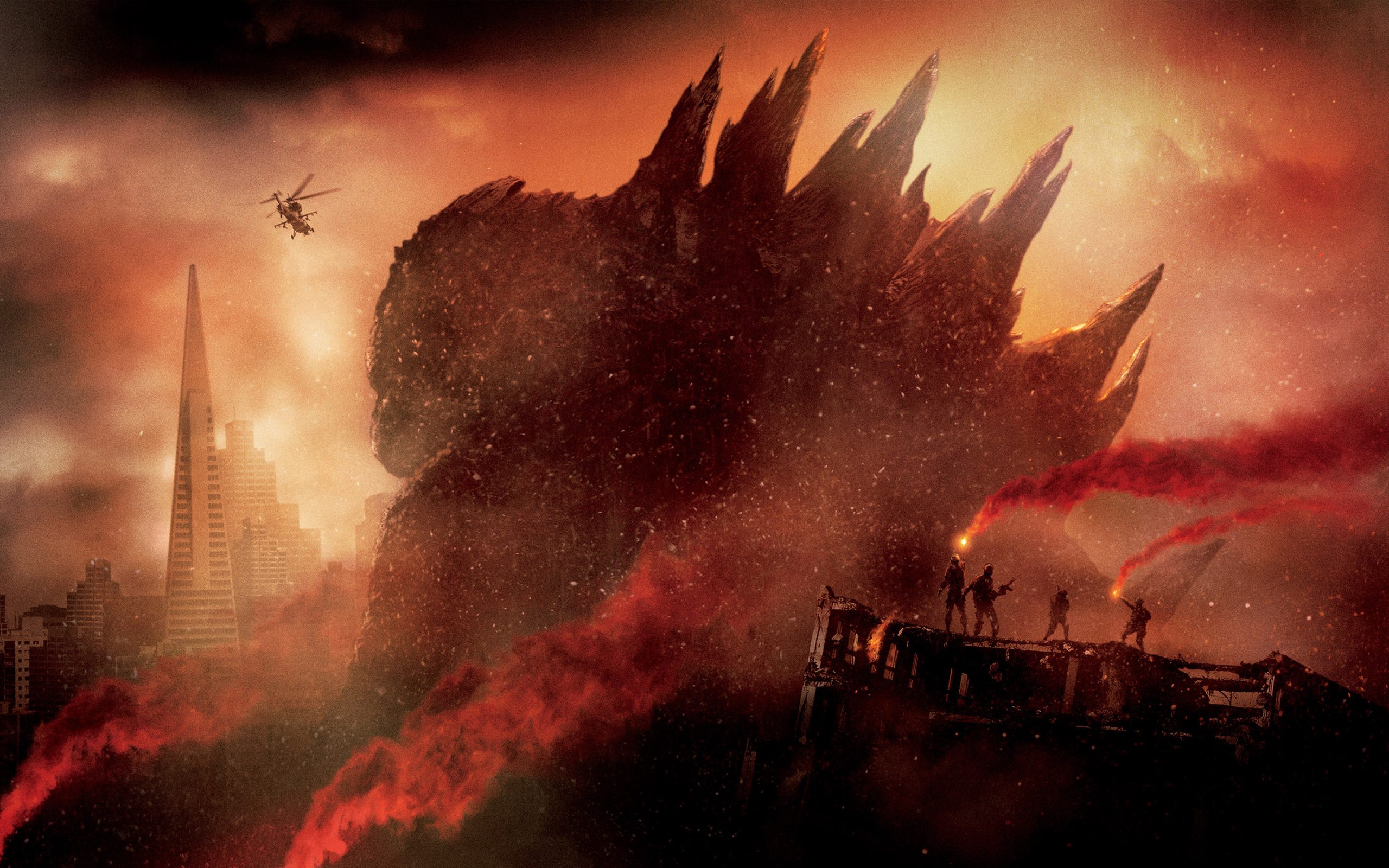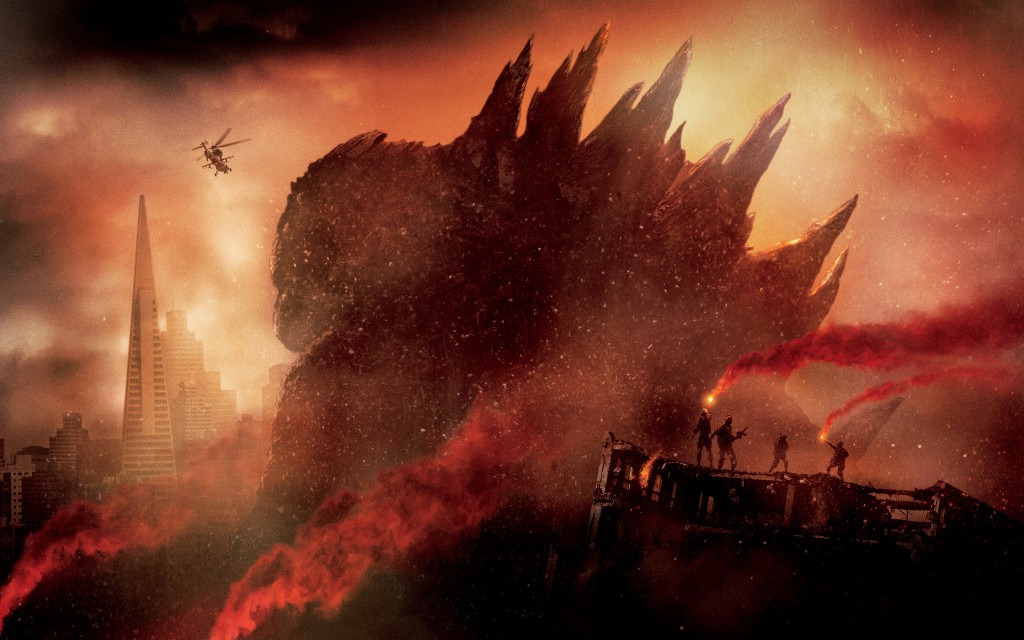
Ladies and gentlemen, the slate has been wiped clean: the 1998 Roland Emmerich catastrophe lies buried, and the ignominy cloaking Godzilla’s good name like a miasma has been decisively decontaminated. Gareth Edwards’ new reboot delivers it all: character-driven drama, gnarly creature effects, epic devastation, and a high dosage of misanthropic Law to unsettle comfortable Western viewers.
Godzilla is a win because real, human characters find themselves engulfed within an unthinkable, inhuman crisis. Unlike most monster blockbusters, this film is first and foremost a drama about family. The narratives centers itself around Ford Brody (portrayed by Aaron Taylor-Johnson) a young man whose family was shattered in an enigmatic nuclear disaster fifteen years ago. He’s made a fresh start with his wife and son and has tried to leave the tragedy entirely behind him. That attempt to quarantine the past is complicated by his father (superbly brought to life by Bryan Cranston), a man whose life froze at that very moment like timepieces in Hiroshima the day the bomb was dropped. Cranston’s character is a prophetic voice in the wilderness tirelessly accusing the powers that be of covering up what really happened that day, a voice his son tries to ignore and distance himself from.
All of that changes when something hatches on the very site of the incident that irrevocably changed their lives. That something is a MUTO: a Massive Unidentified Terrestrial Organism, an enormous beast which parasitically feeds off of mankind’s radioactive waste and weaponry. The MUTOs are primordial creatures which have been dormant for millennia but have emerged from hibernation due to the enormous food supply we’ve provided in the form of byproducts from a century plus of industrial imperialism. The film’s opening scene flags this up by showing us thousands of slave laborers toiling away for the “Western Universal” company (seriously, is there a better name we could use to gesture towards modernity run amok?), gouging open the earth to construct a quarry and uncovering both the skeleton of a gigantic monster and the escape route of what we will later discover is a MUTO.
Godzilla thus chronicles the repercussions unleashed by Nature when man presumes he can rape the natural world with impunity. “Man’s arrogance is thinking he is in control of nature and not the other way around,” Ken Watanabe’s character sighs near the film’s climax. Modern man’s inflated sense of self pushes God out of the picture and supplants Him as center of the universe. What signal is there that can awaken him out of his stupor? What can unmask his true, pathetic nature and drive him to repentance? What other than the very world he has trampled upon, the natural order which bristles with fury at its abuse? The film’s theology places Law front and center by portraying the devastating consequences of modern man’s decision to pervert his task as steward over nature.
The Law, you see, is a closed system; what goes in comes back out, and what comes out dialectically mirrors the input. Disregard for the Law returns as wrath. In this film, man’s arrogant exploitation of nature is seen to store up offense until, as the Bible puts it, his iniquity is filled up or completed (e.g. Genesis 15:16, Daniel 8:23, Matthew 23:32, 1 Thessalonians 2:16). Modern man suppresses the truth that worldly power subverts itself and carries its own ruin within it like potential energy. When his sins are fully charged and the saturation point is reached, then the floodgates burst and his sins are revisited upon him. Nature reciprocates by unleashing its fury in the form of the MUTOs and the carnage they leave in their wake.
“Man vs. Nature is the predominant theme of the film,” Gareth Edwards told The Daily Beast this week, “and I always tried to go back to that imagery.”
At the beginning when they find the fossils, it was important to me that they didn’t just find them—it was caused by our abuse of the planet. We deserved it, in a way. So there’s this rainforest with a big scar in the landscape with this quarry, slave labor, and a Western company. You have to ask yourself, “What does Godzilla represent?” The thing we kept coming up with is that he’s a force of nature, and if nature had a mascot, it would be Godzilla. So what do the other creatures represent? They represent man’s abuse of nature, and the idea is that Godzilla is coming to restore balance to something mankind has disrupted
Man’s abandonment of his role as steward of the earth is indicative of his abandonment of the God of the covenant, but more than that, his will to usurp God’s place as God. When man petulantly makes himself out as something he doesn’t allow God to be God. The truth of the matter is that man is nothing in himself- he is utterly dependent upon the Creator. To return things to how they ought to be, man must be exposed as that which he truly is: nothing. God’s end goal of rescuing the wasted sinner hinges upon properly humbling the sinner by bringing the reality of his law-breaking to light. This dialectic lies at the heart of Luther’s theology of the cross, the Law/Gospel dynamic between God’s opus proprium (His proper work) and His opus alienum (His alien work). Luther sometimes distinguishes between the two as the works of the right hand and of the left hand, respectively; God’s proper work consists in rescuing, forgiving, healing, and restoring, while His alien work consists in accusing, condemning, devastating and taking away hope. The two works cooperate towards one end, as Thesis 16 of the Heidelberg Disputation states: “Thus an action which is alien to God’s nature results in a deed belonging to his very nature: he makes a person a sinner so that he may make him righteous.” God’s opus proprium lies veiled within His opus alienum, delivering the grace of the gospel via the eye-opening assault of the Law. Viewing Godzilla through this lens identifies the MUTOs as the left hand instruments of judgment and Godzilla himself as the right hand restorer who cancels out the Law’s just accusations and its demands for blood.
This hidden realm reveals itself when these alien forces are granted free reign to smash apart man’s supposed superiority and shatter his illusion of control. They give the lie to all our narratives of “progress” and expose how pitiful, how inconsequential we truly are. Proper perspective can only be restored by bringing all of man’s pretensions to nothing, and the MUTOs waste no time in leveling our civilization. There is nothing our scientific hegemony can produce capable of countering their destructive power. Our only hope arrives in the form of Godzilla, another alien power rising out of this same realm and descending into ours. It’s crucial we understand that Godzilla isn’t our champion- his concern and ours simply overlap for a moment. Painting Godzilla as humanity’s hero would amount to making man the center of the universe all over again. What we have instead is ancient, inhuman enmity at work: Godzilla hates the MUTOs and wants them dead, and it’s sheer, unmitigated grace that he winds up saving the day as he prosecutes his mission. Godzilla’s aid comes veiled in the same unhuman indifference which had delivered our judgment. It’s grace which moves him to intervene and cancel the full penalty we rightly deserve. This is the left and the right hand working simultaneously, critiquing in order to comfort, casting down in order to exalt, killing in order to make alive.
Unfortunately, all Godzilla can do is cancel our debt for the time being; left unchanged, we will rack up our debt again. We’ll repent in the enormity of the moment, but give us time, and we will become comfortable again. Godzilla can only rescue the beleaguered human race and balance the equation man upset; like Israel’s judges, Godzilla has no salvific power to redeem and transform those he liberates. His saving ability is only a type of the redemptive power of the Christ. Godzilla dies for no one: once his task of defeating his foes is done, he withdraws and leaves man behind, to, like ancient Israel, begin the cycle of hubris and ruin yet again. And we will.
[youtube=https://www.youtube.com/watch?v=vIu85WQTPRc&feature=kp&w=600]

COMMENTS
8 responses to “The Right Hand of Godzilla”
Leave a Reply











 Godzilla incarnates the wrath of the Law by evoking a consistent tone of Lovecraftian, anti-human terror. Godzilla and the MUTOs represent a domain totally alien to the human, uncontrollable by our will to power and indifferent to our desires and drives. Their motivations have nothing to do with ours; even calling them “anti-human” gives the mistaken impression that they have anything to do with us at all. The MUTOs don’t hate us- they kill us simply because we’re small and in the way. These creatures are lords over the inhuman, at home in the world we imagined we had subjugated, erupting out of the unknown to open man’s eyes to his place in that world.
Godzilla incarnates the wrath of the Law by evoking a consistent tone of Lovecraftian, anti-human terror. Godzilla and the MUTOs represent a domain totally alien to the human, uncontrollable by our will to power and indifferent to our desires and drives. Their motivations have nothing to do with ours; even calling them “anti-human” gives the mistaken impression that they have anything to do with us at all. The MUTOs don’t hate us- they kill us simply because we’re small and in the way. These creatures are lords over the inhuman, at home in the world we imagined we had subjugated, erupting out of the unknown to open man’s eyes to his place in that world.



Sick insight! Have you ever considered writing about badges of the Christian faith?!
very good ian!!! 🙂
Powerful.
Honda’s original version will forever remain the definitive treatise on Man’s incompetent Atomic tinkering.
-Peter H. Brothers, author of “Mushroom Clouds and Mushroom Men: The Fantastic Cinema of Ishiro Honda.”
I absolutely agree! The only thing the Honda original didn’t have going for it was Heisenberg.
Excellent review. Most excellent.
Thank you for such an insightful review, Ian!